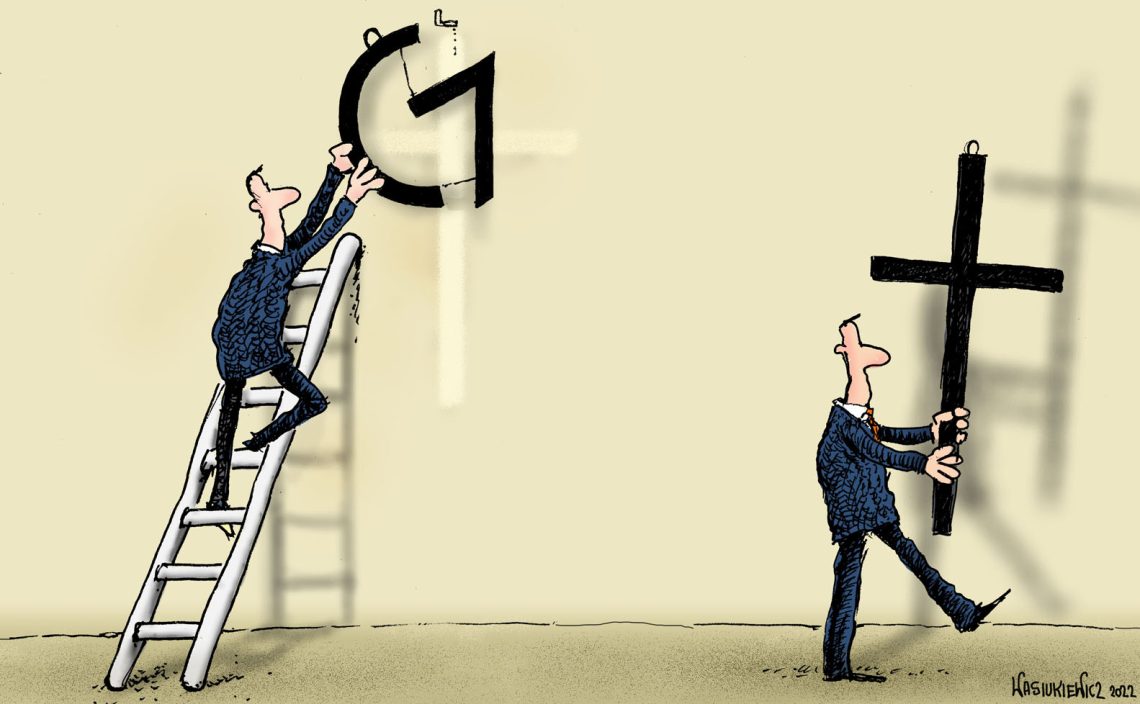The G7 summit and the strange incident of the vanishing cross
Ahead of a G7 summit at the historic Muenster Town Hall, German officials sparked widespread outrage by removing a 16th-century cross from the meeting room.

The G7 is an informal association bringing together the main Western powers so they can coordinate their actions. It consists of Canada, France, Germany, Italy, Japan, the United Kingdom and the United States. The rotating chairmanship is currently held by Germany.
During the June 2022 leaders’ summit in Elmau, Bavaria, the seven nations reaffirmed their commitment to the shared G7 values of freedom and liberal democracy against the rise of authoritarianism.
Last week, a meeting of the G7 ministers of foreign affairs took place in Muenster, Germany. The summit was held in the old town hall – a fitting location since this is where part of the Westphalian peace agreement of 1648 was signed in the aftermath of the Thirty Years’ War. After decades of shifting alliances and bloody warfare, exhausted nations agreed to seek peace and diplomatic conflict resolution. The war had taken place mostly on the territory of the Holy Roman Empire in the center of Europe and involved nearly all European powers. The toll on the civilian population was dreadful.
This historic diplomatic success was achieved by not labeling any side as the losing party, and focusing on rebuilding relations between states instead. The so-called Westphalian order laid the foundation for today’s political framework.
Although they are secular states, the political tradition of the G7 countries has Christian roots.
Now that peace is once again jeopardized by aggressors, ideologies and principalism, Muenster is a good meeting place. The spirit of Westphalia could inspire Western democracies to find civilized and pragmatic solutions.
Ahead of the summit, the German Ministry of Foreign Affairs published the following statement:
The Federal Minister of Foreign Affairs, Annalena Baerbock, will host and lead the work process of the G7 foreign ministers until 31 December 2022.
The work of the G7 foreign ministers will focus on current issues and strategic challenges in foreign and security policy. Particular attention will be paid to Russia’s attack on Ukraine and the consequences for Europe, transatlantic cooperation and the international order.
In addition, Germany is pursuing a “prevention and transformation agenda” under the “G7 Foreign Ministers’ Track” with the following work priorities:
- Expanding the climate commitment within and beyond the G7
- Overcoming the pandemic and its consequences as well as ensuring sustainable global vaccine supply and equity
- Strengthening the resilience of democracy
This seems like a sound program. However, a strange and disturbing incident took place during the summit. In the Muenster city hall where the event was taking place, a small cross hung on the wall. It had been in place for more than 450 years. But by the time the meeting began, the cross was gone – removed by the German Ministry of Foreign Affairs, which claimed it did not reflect the beliefs of all participants. Ms. Baerbock stated that it was an organizational necessity, and that she had not been involved in the decision.
With the exception of Japan, which is most likely reasonable enough not to have been offended, the majority of the population in all G7 countries is Christian. Although they are secular states, their political tradition (including the separation of Church and state) has Christian roots. Denying those roots will only hinder the G7’s goal of “strengthening the resilience of democracy.”
What could be the agenda behind such a gesture? More and more, we see an authoritarian anti-Christian attitude in today’s technocratic systems. Western technocracies are beginning to exhibit features that could undermine free societies.
Thorsten Frei, a member of Germany’s Bundestag, put it best:
“Only those who stand by their own tradition and social character can also approach others openly, sovereign and with self-confidence,” said Mr. Frei. “The Christian ideal of man is the common basis of the liberal and constitutional democracies of the G7 states.”
